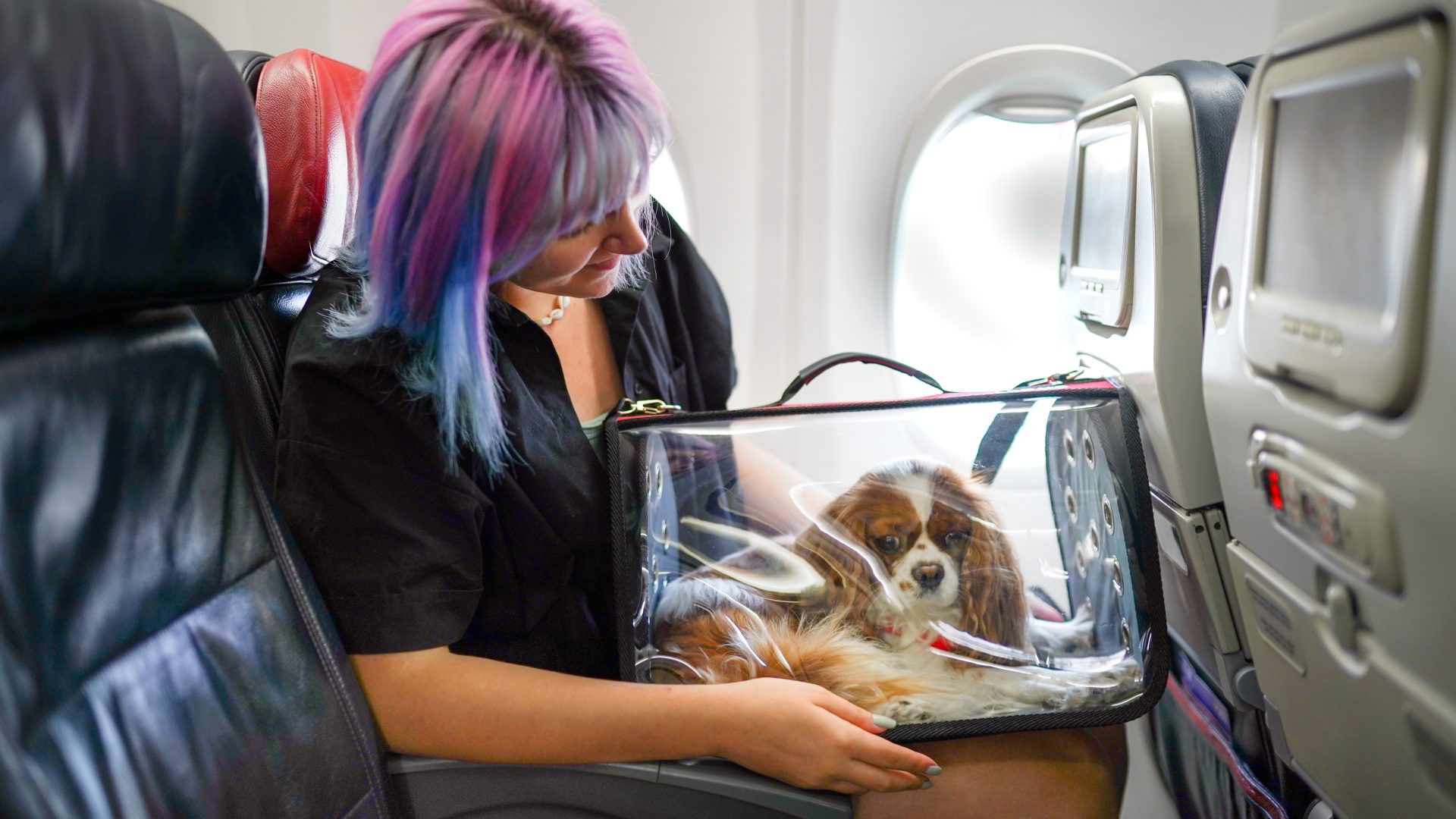Many pet owners often wonder whether it’s possible to ship a dog on an airplane. Whether it’s for a vacation, a move to a new location, or some other reason, the idea of sending a beloved furry friend on a plane can be daunting. Fortunately, the answer is yes – you can ship a dog on an airplane, but there are specific guidelines and considerations that must be taken into account to ensure the safety and well-being of the pet.

Credit: www.nerdwallet.com
Important Considerations
Before deciding to ship a dog on an airplane, there are several crucial factors to consider. These include the dog’s size, breed, age, health, temperament, and the airline’s specific regulations. It’s essential to assess whether the dog is fit for air travel and can endure the experience without undue stress or health risks.
Size And Breed
When it comes to shipping dogs, the size and breed of the dog play a significant role. Some airlines have restrictions on the size and breed of dogs that can be transported in the cabin or as cargo. Small dogs that meet specific size and weight requirements may be allowed to travel in the cabin with their owners, while larger breeds may need to travel as cargo.
| Size | Allowed in Cabin | Required as Cargo |
|---|---|---|
| Small | Yes | No |
| Large | No | Yes |
Age And Health
The age and health of the dog are critical factors in determining whether it’s safe for the dog to be shipped on an airplane. Puppies must be at least 8 weeks old to travel by air, and they should be fully weaned and in good health. Moreover, dogs with underlying health issues or senior dogs may not be suitable candidates for air travel due to the potential risks involved.
Temperament
The temperament of the dog is another important consideration. Dogs that exhibit signs of extreme anxiety, fear, or aggression may not be suitable for air travel. It’s vital to assess whether the dog can handle the stress of air travel and being in an unfamiliar environment for an extended period.
Airline Regulations
Each airline has its own set of rules and regulations concerning the transportation of pets. It’s crucial to research and understand the specific requirements of the airline you plan to use for shipping your dog. This includes information on pet fees, required documentation, carrier specifications, and any additional restrictions or guidelines that may apply.
Pet Fees
Most airlines charge a pet transportation fee, which can vary widely depending on the airline and the type of pet transport (cabin or cargo). It’s important to factor in these fees when planning to ship a dog on an airplane to avoid any unexpected financial burdens.
Documentation
Documentation requirements for shipping a dog on an airplane typically include a valid health certificate issued by a licensed veterinarian, proof of vaccinations, and any other necessary permits or paperwork. It’s essential to ensure that all required documentation is in order before the travel date to prevent any last-minute issues.
Carrier Specifications
The type and size of the pet carrier are subject to specific guidelines set by the airline. It’s crucial to select an airline-approved pet carrier that provides adequate space for the dog to stand, turn around, and lie down comfortably. Additionally, the carrier should meet the airline’s safety and ventilation requirements.
Additional Restrictions
Some airlines may impose additional restrictions on pet transport, such as breed-specific regulations, seasonal embargoes due to extreme weather conditions, and limitations on the number of pets allowed on a single flight. Being aware of these restrictions can help in planning the dog’s travel more effectively.
Pre-Flight Preparations
Once all the necessary considerations and requirements have been addressed, there are several preparatory steps that should be taken to ensure a smooth and safe travel experience for the dog.
Veterinary Check-up
Prior to the travel date, it’s advisable to schedule a visit to the veterinarian for a thorough health check-up. This allows the vet to ensure that the dog is fit for air travel and is up-to-date on vaccinations, as well as provide any additional guidance for the journey.
Acclimatization To Carrier
It’s essential to acclimate the dog to the travel carrier well in advance. This can be done by gradually introducing the carrier to the dog, allowing them to spend time in it, and associating it with positive experiences through treats and praise. Familiarizing the dog with the carrier helps reduce anxiety during the actual journey.
Hydration And Feeding Schedule
Managing the dog’s hydration and feeding schedule is crucial, especially if the travel involves extended periods of time. Providing access to water and a light meal a few hours before the flight can help prevent any discomfort or issues related to hunger or thirst during the journey.
Identification And Contact Information
Ensuring that the dog has proper identification, including a secure collar with tags and a microchip, is vital. Additionally, it’s important to attach a label to the carrier with the owner’s contact information and any pertinent details that may be necessary in case of an emergency.

Credit: www.smithsonianmag.com
Frequently Asked Questions Of Can You Ship A Dog On An Airplane
Can You Bring A Dog On An Airplane?
Yes, you can bring your dog on an airplane, but restrictions and policies vary among airlines.
How Much Does It Cost To Ship A Dog On An Airplane?
The cost to ship a dog on an airplane depends on factors such as distance, size of the dog, and airline fees. Prices typically range from $100 to $500.
What Are The Size And Weight Restrictions For Dog Air Travel?
Size and weight restrictions for dog air travel vary by airline. Most airlines require dogs to fit comfortably within a carrier under the seat in front of you and weigh less than 20 pounds.
Do Dogs Travel In The Cabin Or In The Cargo Hold?
Depending on their size, dogs can travel in the cabin or in the cargo hold. Small dogs can typically travel in the cabin, while larger dogs will need to be transported in the cargo hold.
Conclusion
Shipping a dog on an airplane is indeed possible, but it requires careful planning, adherence to regulations, and prioritizing the well-being of the pet. By considering the dog’s size, health, temperament, and the specific guidelines of the airline, pet owners can navigate the process of air travel for their furry companions with confidence and ensure a safe and comfortable journey.
Remember, a well-prepared and well-cared-for dog can travel by air and reunite with its owner in a distant destination, sharing many more happy moments together.


